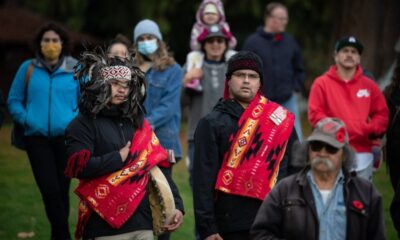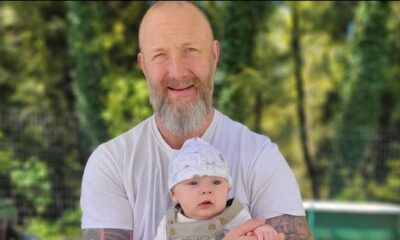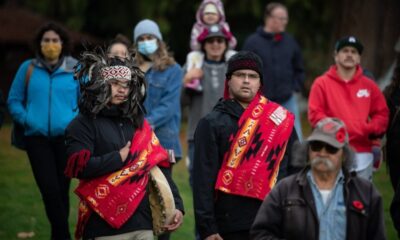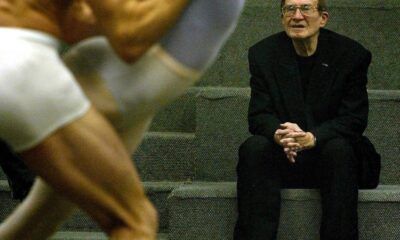Top Stories
Indigenous Veterans Day Highlights Ongoing Struggles, Sacrifices
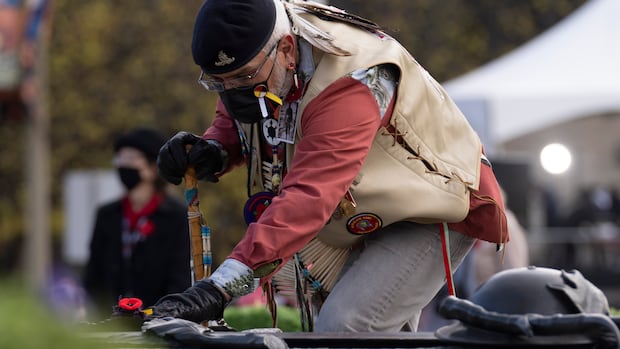
UPDATE: Canada is recognizing Indigenous Veterans Day today, November 8, spotlighting the ongoing battles faced by Indigenous veterans both abroad and at home. New reports confirm that the sacrifices of these soldiers remain overshadowed by the discriminatory realities they encountered upon returning from war.
John Moses, a member of the Delaware and Upper Mohawk bands from Six Nations of the Grand River, shared a poignant story about his father, Russell Moses, a veteran of the Korean War. When Russell returned to Canada in 1952, he was denied entry to a bar in Hagersville, Ontario, solely due to his race. “That was not unique,” John Moses stated, emphasizing the irony faced by many Indigenous veterans who fought for freedom overseas only to return to a country where they were still marginalized.
Today’s observance serves as a reminder of their sacrifices, with historian Scott Sheffield noting that many Indigenous servicemen found camaraderie and acceptance in the military, a stark contrast to their experiences at home. “After having fought abroad for the sovereignty of small nations, they returned to a country where they did not enjoy the same range of civil rights,” Sheffield explained.
Indigenous Veterans Day, which began as a grassroots movement in Winnipeg in 1993, has evolved into a nationally recognized day of remembrance. This year, the focus is on the more than 4,000 Indigenous people who served during the World Wars and the Korean War, with reports suggesting that the actual number may be as high as 4,300 for World War II alone.
Sheffield added that for many Indigenous veterans, enlisting was not just about serving their country but also a declaration of their right to belong. Notable figures like Tommy Prince, one of Canada’s most decorated veterans, encapsulated this sentiment, fighting to prove that Indigenous soldiers were as capable as their non-Indigenous counterparts.
Despite the recognition of their service, the return home often saw Indigenous veterans facing the same prejudices they thought they had left behind. “They expected that acceptance to continue after the war, but instead, they found themselves ‘just an Indian again,'” Sheffield noted. This disillusionment led many to re-enlist, seeking that sense of purpose and belonging once more.
As reconciliation efforts gain momentum in Canada, initiatives have emerged to honor Indigenous veterans. The Last Post Fund Indigenous Initiative, launched in March 2019, aims to ensure that no veteran is denied a dignified funeral or burial. To date, over 265 grave markers have been placed to honor unrecognized Indigenous veterans.
Veterans Affairs Canada acknowledges the unfair treatment faced by Indigenous soldiers, admitting that many believed their sacrifices would lead to improved rights and standing within society. However, the reality has been starkly different, leaving lasting impacts on Indigenous communities.
As Canada reflects on Indigenous Veterans Day today, ceremonies across the country, including one at the National War Memorial in Ottawa, are serving as powerful reminders of the shared sacrifices of Indigenous and non-Indigenous soldiers alike. Sheffield emphasized the importance of mutual respect and camaraderie, which existed even before formal reconciliation efforts began.
This year’s observance is not merely a commemoration but a call to action for all Canadians to recognize and honor the contributions of Indigenous veterans while continuing to advocate for their rights and recognition in society. The legacy of their service is a vital part of Canada’s history, and today, as the nation pauses to remember, it also reaffirms its commitment to a path of reconciliation.
Stay tuned for more updates as communities across Canada engage in ceremonies and discussions to honor Indigenous veterans and reflect on their sacrifices.
-

 World4 months ago
World4 months agoScientists Unearth Ancient Antarctic Ice to Unlock Climate Secrets
-

 Politics2 days ago
Politics2 days agoSecwepemc First Nation Seeks Aboriginal Title Over Kamloops Area
-

 Entertainment4 months ago
Entertainment4 months agoTrump and McCormick to Announce $70 Billion Energy Investments
-

 Lifestyle4 months ago
Lifestyle4 months agoTransLink Launches Food Truck Program to Boost Revenue in Vancouver
-

 Science4 months ago
Science4 months agoFour Astronauts Return to Earth After International Space Station Mission
-

 Technology2 months ago
Technology2 months agoApple Notes Enhances Functionality with Markdown Support in macOS 26
-

 Top Stories4 weeks ago
Top Stories4 weeks agoUrgent Update: Fatal Crash on Highway 99 Claims Life of Pitt Meadows Man
-

 Sports4 months ago
Sports4 months agoSearch Underway for Missing Hunter Amid Hokkaido Bear Emergency
-

 Politics3 months ago
Politics3 months agoUkrainian Tennis Star Elina Svitolina Faces Death Threats Online
-

 Politics4 months ago
Politics4 months agoCarney Engages First Nations Leaders at Development Law Summit
-

 Technology4 months ago
Technology4 months agoFrosthaven Launches Early Access on July 31, 2025
-

 Top Stories2 weeks ago
Top Stories2 weeks agoFamily Remembers Beverley Rowbotham 25 Years After Murder



